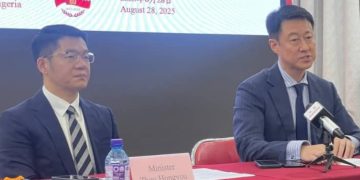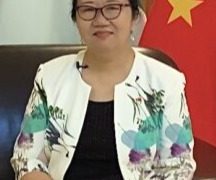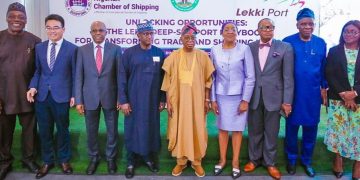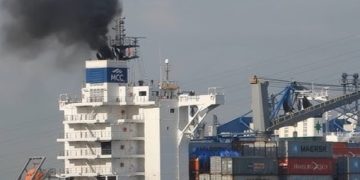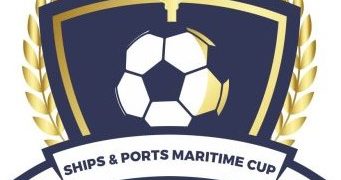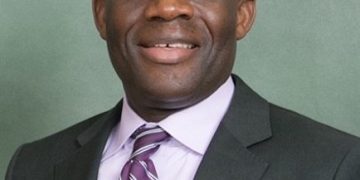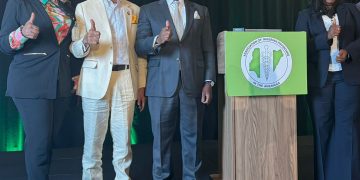- Managing Director, National Inland Waterways Authority, Bola Oyebamiji (left, front row), Executive Secretary/Chief Executive Officer, Nigerian Shippers’ Council, Dr. Pius Akutah, Managing Director, Nigerian Ports Authority, Dr. Abubakar Dantsoho, Director-General, Nigerian Maritime Administration and Safety Agency, Dr. Dayo Mobereola, Permanent Secretary, Ministry of Marine and Blue Economy, Olufemi Oloruntola, Minister of Marine and Blue Economy, Adegboyega Oyetola, Provost, Federal College of Freshwater Fisheries Technology, Baga, Professor Bako Modu, and Provost, Federal College of Fisheries and Marine Technology, Dr. Chuks Onuoha, at the citizens and stakeholders’ engagement on National Marine Policy Implementation
By Anthony Nwachukwu
The Ministry of Marine and Blue Economy, partnering maritime stakeholders, has begun fast tracking the implementation of the recently approved National Policy on Marine and Blue Economy through a collaborative engagement to forge a unified, action-oriented strategy for the sector’s transformation.
In his address at a strategic forum on the policy’s implementation in Lagos, the Minister, Adegboyega Oyetola, said the policy offers a structured framework to unlock value across Nigeria’s vast marine ecosystems, including port infrastructure, maritime security, aquaculture, coastal tourism, ocean governance, marine biotechnology, renewable energy, and climate resilience.
Oyetola told the stakeholders that the forum was a practical working session designed to craft an implementation roadmap with clear institutional responsibilities and measurable deliverables.
Therefore, he stressed the need for inter-agency coordination, accountability mechanisms and capacity building, affirming that citizen engagement and shared ownership are essential to the success of the policy.
He emphasised that inclusive policy-making yields stronger development outcomes, particularly in complex and interconnected sectors such as the marine economy.
In an update on priority areas, Oyetola said the federal government has commenced reconstruction of the Apapa and Tin Can Ports under the Western Port Rehabilitation Programme, while procurement processes are ongoing for the Eastern Ports.
According to him, these physical upgrades are being matched with digital innovations such as the Port Community System, an electronic call-up platform, and a unified one-stop-shop for port clearance – all aimed at reducing congestion, boosting investor-confidence, and re-establishing Nigeria as a maritime hub in West and Central Africa.
He also reiterated government’s commitment to reviving indigenous shipping capacity under a public-private partnership model, over which the Nigerian Maritime Administration and Safety Agency has begun preparatory work for the transparent disbursement of the Cabotage Vessel Financing Fund.
Oyetola also highlighted recent strides in enhancing inland waterways transport, with the National Inland Waterways Authority distributing over 42,000 safety jackets, deploying ferries and patrol boats and training water marshals in line with the Inland Waterways Transportation Regulation, 2023, on national water safety.
On fisheries and aquaculture, the minister said the recent transfer of the Department of Fisheries and Aquaculture to the ministry has sparked renewed efforts to reposition the sector, which includes the revival of fishing terminals, automation of licensing systems, and incentives for responsible investment in aquaculture.
Significantly, Oyetola noted that maritime security remains central to the ministry’s agenda, stating that through the Deep Blue Project, “Nigeria has maintained zero piracy incidents in its territorial waters for three consecutive years, earning praise from the international community and contributing to regional maritime stability.
He further disclosed that Nigeria’s offer to host the African Union Combined Maritime Task Force in Lagos has been endorsed by the AU Peace and Security Council.
Meanwhile, the federal government, through the National Policy on Marine and Blue Economy, hopes to unlock the sector’s potentials in order to achieve its targeted annual sectoral growth of 7 per cent, according to the policy implementation document.
With this, an additional one million jobs are also targeted in the marine and blue economy sector by 2034 through implementing the planned activities. Noting that the opportunities for creating additional jobs are immense, the policy document stated that “the marine and blue economy will contribute its quota by creating up to 1 million jobs by 2034.”
This will include a yearly target of 100,000 direct and indirect new jobs from planned activities in the sector, such as “construction jobs in port infrastructure modernisation and development projects, ship crews for new locally owned shipping vessels, and workers for fish cold storage facilities to be established across the country.”
According to the policy, 50 per cent of the new jobs to be created are for youths aged 18 to 35 years, 70 per cent of whom should be women and people with special needs.
It further stated that the “vision for the marine and blue economy will be delivered over a 10-year period from 2025 to 2034,” focusing on driving economic growth and inclusive prosperity to enable the sector contribute significantly to national GDP and growth targets.
The other is to ensure healthy marine ecosystems and sustainability through development of a blue economy that provides essential benefits for current and future generations, just as it hopes to facilitate deep knowledge-led innovations to unlock the potentials of science and technology for innovative oceans-sustainable initiatives.





